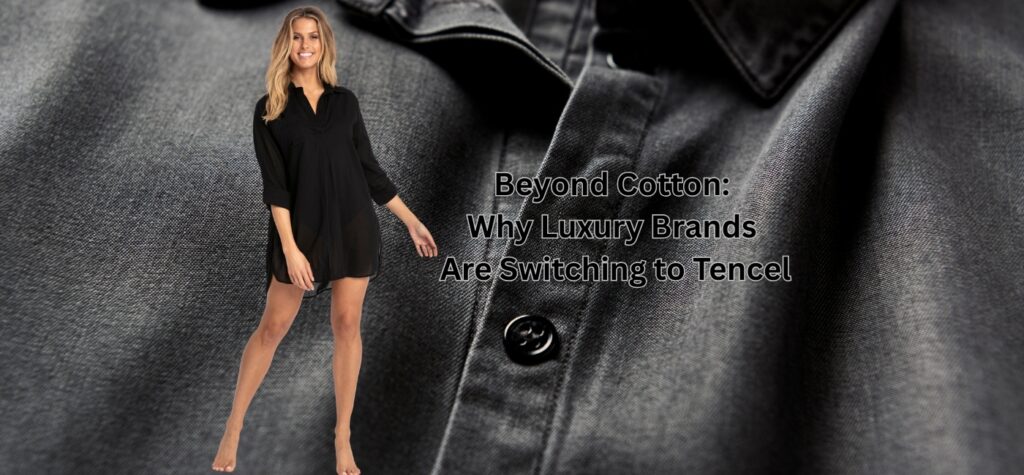The luxury fashion landscape is undergoing a quiet revolution. While cotton long reigned as the gold standard for premium natural fabrics, a new contender has emerged from Austria’s Lenzing AG that represents the future of sustainable luxury: Tencel.

But what’s driving this shift among discerning designers and premium brands? It’s not just about sustainability—it’s about superior performance, unparalleled comfort, and meeting the evolving values of luxury consumers.
The Limitations of Conventional Luxury
For decades, luxury brands relied on premium cotton varieties like Egyptian or Pima for their high-end collections. While these offer excellent quality, they come with hidden costs:
- Water Intensity: Conventional cotton requires approximately 2,700 liters of water to produce a single t-shirt
- Chemical Usage: Cotton farming accounts for 16% of global insecticide use
- Quality Variability: Inconsistent fiber length and strength affect final product quality
- Limited Innovation: Traditional processing offers little room for technical advancement
The Tencel Advantage: Redefining Luxury

1. Unmatched Softness & Drape
Tencel Lyocell fibers possess a smooth, silky texture that surpasses even the finest cottons. The fabric’s natural fluidity and exquisite drape create the elegant silhouette luxury consumers expect, while its breathability ensures comfort in any climate.
2. Superior Sustainability Story
Unlike conventional cotton, Tencel is produced through an award-winning closed-loop process that:
- Recycles 99% of water and solvents
- Uses sustainably sourced wood from certified forests
- Requires significantly less water than cotton production
- Is fully biodegradable and compostable
3. Technical Performance
Luxury today means performance too. Tencel offers:
- Exceptional moisture-wicking properties
- Natural resistance to odor-causing bacteria
- Enhanced durability and color retention
- Consistent quality batch after batch
Comparative Analysis: Tencel vs. Premium Cotton
| Feature | Tencel Lyocell | Premium Egyptian Cotton |
|---|---|---|
| Softness | Silky, smooth feel | Soft, natural feel |
| Sustainability | Closed-loop process, low water use | High water requirement, chemical use |
| Moisture Management | 50% higher absorption than cotton | Good absorption |
| Durability | Stronger when wet, maintains shape | Prone to stretching over time |
| Environmental Impact | Biodegradable, minimal waste | Biodegradable but high resource use |
| Production Transparency | Traceable supply chain, certifications | Complex, often opaque supply chain |
Why Luxury Consumers Prefer Tencel
Modern luxury shoppers seek more than just a brand name—they want products that align with their values. Tencel delivers:
- Authentic Sustainability: Verifiable through Lenzing’s certification system
- Performance Benefits: Tangible improvement in comfort and wearability
- Storytelling Potential: A compelling narrative about innovation and responsibility
- Investment Value: Longer-lasting garments that maintain their beauty
Implementation Strategies for Luxury Brands

- Blended Excellence
Combine Tencel with silk or cashmere for enhanced performance without compromising luxury appeal. - Signature Finishing
Develop proprietary treatments that highlight Tencel’s natural lustre and drape. - Transparent Storytelling
Leverage Lenzing’s certification system to provide consumers with supply chain transparency. - Seasonless Collections
Utilize Tencel’s temperature-regulating properties for year-round versatility.
The Future of Luxury is Responsible
Leading luxury houses from Stella McCartney to Gucci have already incorporated Tencel into their collections, recognizing that true modern luxury must balance exceptional quality with environmental responsibility.
As consumer awareness grows and sustainability becomes non-negotiable, Tencel represents not just an alternative to cotton, but the new standard for what luxury can—and should—be.

